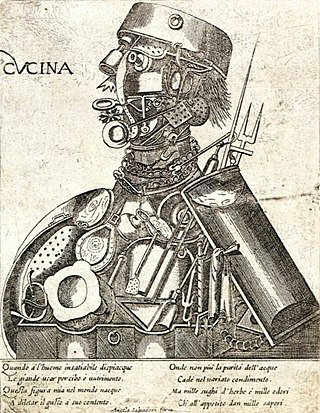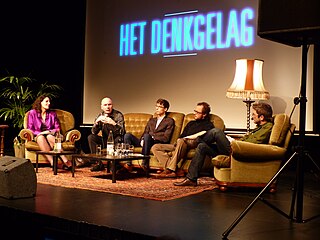The Foresight Institute (Foresight) is a San Francisco-based research non-profit that promotes the development of nanotechnology and other emerging technologies, such as safe AGI, biotech and longevity.
Robert A. Freitas Jr. is an American nanotechnologist.

William Stephen George Mann is a Canadian engineer, professor, and inventor who works in augmented reality, computational photography, particularly wearable computing, and high-dynamic-range imaging. Mann is sometimes labeled the "Father of Wearable Computing" for early inventions and continuing contributions to the field. He cofounded InteraXon, makers of the Muse brain-sensing headband, and is also a founding member of the IEEE Council on Extended Intelligence (CXI). Mann is currently CTO and cofounder at Blueberry X Technologies and Chairman of MannLab. Mann was born in Canada, and currently lives in Toronto, Canada, with his wife and two children.
Gray goo is a hypothetical global catastrophic scenario involving molecular nanotechnology in which out-of-control self-replicating machines consume all biomass on Earth while building many more of themselves, a scenario that has been called ecophagy. The original idea assumed machines were designed to have this capability, while popularizations have assumed that machines might somehow gain this capability by accident.

The Institute for Ethics and Emerging Technologies (IEET) is a technoprogressive think tank that seeks to "promote ideas about how technological progress can increase freedom, happiness, and human flourishing in democratic societies." It was incorporated in the United States in 2004, as a non-profit 501(c)(3) organization, by philosopher Nick Bostrom and bioethicist James Hughes.

Techno-progressivism or tech-progressivism is a stance of active support for the convergence of technological change and social change. Techno-progressives argue that technological developments can be profoundly empowering and emancipatory when they are regulated by legitimate democratic and accountable authorities to ensure that their costs, risks and benefits are all fairly shared by the actual stakeholders to those developments. One of the first mentions of techno-progressivism appeared within extropian jargon in 1999 as the removal of "all political, cultural, biological, and psychological limits to self-actualization and self-realization".

Natasha Vita-More is a strategic designer, author, speaker and innovator within the scientific and technological framework of human enhancement and life extension. Her interests are located within the ethical uses of science and technology and socio-political implications of revolutionary advances impacting humanity's future.
The Feynman Prize in Nanotechnology is an award given by the Foresight Institute for significant advances in nanotechnology. Two prizes are awarded annually, in the categories of experimental and theoretical work. There is also a separate challenge award for making a nanoscale robotic arm and 8-bit adder.
Arthur J. Carty,, is a Canadian academic and former National Science Advisor to the Government of Canada.

Chad Alexander Mirkin is an American chemist. He is the George B. Rathmann professor of chemistry, professor of medicine, professor of materials science and engineering, professor of biomedical engineering, and professor of chemical and biological engineering, and director of the International Institute for Nanotechnology and Center for Nanofabrication and Molecular Self-Assembly at Northwestern University.

A global catastrophic risk or a doomsday scenario is a hypothetical future event that could damage human well-being on a global scale, even endangering or destroying modern civilization. An event that could cause human extinction or permanently and drastically curtail humanity's potential is known as an "existential risk."
Digital immortality is the hypothetical concept of storing a person's personality in digital substrate, i.e., a computer, robot or cyberspace. The result might look like an avatar behaving, reacting, and thinking like a person on the basis of that person's digital archive. After the death of the individual, this avatar could remain static or continue to learn and self-improve autonomously.
Nijaz Ibrulj is a Bosnian philosopher and a professor at the University of Sarajevo's Department of Philosophy and Sociology. He lectures on logic, analytic philosophy, methodology of social sciences, theory of knowledge, and cognitive science. His interests also extend to the field of social ontology. Ibrulj was awarded a Fulbright Visiting Scholarship during the 2000-2001 academic years to visit the University of California, Berkeley. His application was sponsored by John Searle and Donald Davidson.
Jewish Futurism is used in three different contexts: religious, artistic and futures studies

The 2045 Initiative is a nonprofit organization that develops a network and community of researchers in the field of life extension, focusing on combining brain emulation and robotics to create forms of cyborgs. It was founded by Russian entrepreneur Dmitry Itskov in February 2011 with the participation of Russian specialists in the field of neural interfaces, robotics, artificial organs and systems. Philippe van Nedervelde serves as the Director of International Development.
Alexander Alexandrovich Bolonkin was a Russian-American scientist and academic who worked in the Soviet aviation, space and rocket industries and lectured in Moscow universities, before being arrested in 1972 by the KGB as a dissident. He served terms of imprisonment and exile for 15 years until 1987, when he emigrated to the US as a political refugee.
Hypothetical technology is technology that does not exist yet, but that could exist in the future. This article presents examples of technologies that have been hypothesized or proposed, but that have not been developed yet. An example of hypothetical technology is teleportation.
The Lifeboat Foundation is a nonprofit organization in Reno, Nevada, dedicated to the prevention of global catastrophic risk. Technology journalist Ashlee Vance describes Lifeboat as "a nonprofit that seeks to protect people from some seriously catastrophic technology-related events". Prominent scholars from Lifeboat Foundation's Advisory Board includes 1986 Nobel Laureate in Literature Wole Soyinka, 1993 Nobel Laureate in Medicine Richard J. Roberts, 2002 Nobel Laureate in Economic Sciences Daniel Kahneman, and 2007 Nobel Laureate in Economic Sciences Eric Maskin.

Transhumanist politics constitutes a group of political ideologies that generally express the belief in improving human individuals through science and technology. Specific topics include space migration, and cryogenic suspension. It is considered the opposing ideal to the concept of bioconservatisim, as Transhumanist politics argue for the use of all technology to enhance human individuals.

Het Denkgelag is a Belgian association without lucrative purpose that organises skeptical conferences in Flanders. Het Denkgelag started out in 2012 as a series of discussion evenings of the skeptical organisation SKEPP, but nowadays functions financially and legally independent from SKEPP. The mission of Het Denkgelag is to popularise scientific topics and to promote critical thinking for a broad audience. It has been described as “laid-back discussion evenings on philosophical, skeptical and scientific topics, in an informal atmosphere, with a crowd of interesting speakers and the audience as the central guest”.







